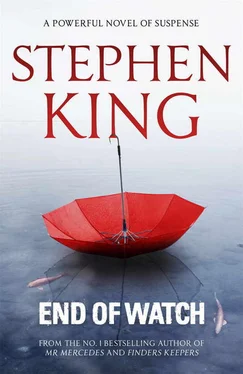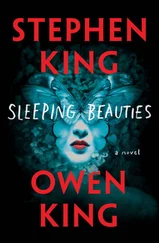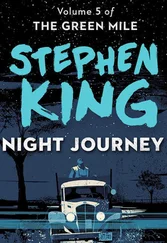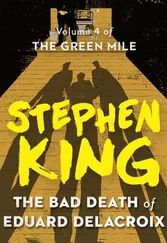She halts at last, trembling. The tears are already freezing on her cheeks. He tilts her face to look at him, knowing she would shrink away if anyone else tried to touch her that way – yes, even Jerome Robinson, and she loves Jerome, probably has since the day the two of them discovered the ghost-program Brady left in Olivia Trelawney’s computer, the one that finally pushed her over the edge and caused her to take her own overdose.
‘Holly, we’re not done with this. In fact I think we might just be getting started.’
She looks him squarely in the face, another thing she will do with no one else. ‘What do you mean?’
‘Something new has come up, something I didn’t want to tell Pete and Izzy. I don’t know what the hell to make of it. There’s no time to tell you now, but when I get back from the doctor’s, I’ll tell you everything.’
‘All right, that’s fine. Go on, now. And although I don’t believe in God, I’ll say a prayer for your test results. Because a little prayer can’t hurt, can it?’
‘No.’
He gives her a quick hug – long hugs don’t work with Holly – and starts back to his car, once more thinking of that thing she said yesterday, about Brady Hartsfield being an architect of suicide. A pretty turn of phrase from a woman who writes poetry in her spare time (not that Hodges has ever seen any, or is likely to), but Brady would probably sneer at it, consider it a mile short of the mark. Brady would consider himself a prince of suicide.
Hodges climbs into the Prius Holly nagged him into buying and heads for Dr Stamos’s office. He’s doing a little praying himself: Let it be an ulcer. Even the bleeding kind that needs surgery to sew it up.
Just an ulcer.
Please nothing worse than that.
21
He doesn’t have to spend time cooling his heels in the waiting room today. Although he’s five minutes early and the room is as full as it was on Monday, Marlee the cheerleader receptionist sends him in before he even has a chance to sit down.
Belinda Jensen, Stamos’s nurse, usually greets him at his yearly physicals with smiling good cheer, but she’s not smiling this morning, and as Hodges steps on the scale, he remembers his yearly physical is a bit overdue. By four months. Actually closer to five.
The armature on the old-fashioned scale balances at 165. When he retired from the cops in ’09, he weighed 230 at the mandatory exit physical. Belinda takes his blood pressure, pokes something in his ear to get his current temperature, then leads him past the exam rooms and directly to Dr Stamos’s office at the end of the corridor. She knocks a knuckle on the door, and when Stamos says ‘Please come in,’ she leaves Hodges at once. Usually voluble, full of tales about her fractious children and bumptious husband, she has today spoken hardly a word.
Can’t be good, Hodges thinks, but maybe it’s not too bad. Please God, not too bad. Another ten years wouldn’t be a lot to ask for, would it? Or if You can’t do that, how about five?
Wendell Stamos is a fiftysomething with a fast-receding hairline and the broad-shouldered, trim-waisted build of a pro jock who’s stayed in shape after retirement. He looks at Hodges gravely and invites him to sit down. Hodges does so.
‘How bad?’
‘Bad,’ Dr Stamos says, then hastens to add, ‘but not hopeless.’
‘Don’t skate around it, just tell me.’
‘It’s pancreatic cancer, and I’m afraid we caught it… well… rather late in the game. Your liver is involved.’
Hodges finds himself fighting a strong and dismaying urge to laugh. No, more than laugh, to just throw back his head and yodel like Heidi’s fucking grandfather. He thinks it was Stamos saying bad but not hopeless. It makes him remember an old joke. Doctor tells his patient there’s good news and bad news; which does the patient want first? Hit me with the bad news, says the patient. Well, says the doctor, you have an inoperable brain tumor. The patient starts to blubber and asks what the good news can possibly be after learning a thing like that. The doctor leans forward, smiling confidentially, and says, I’m fucking my receptionist, and she’s gorgeous .
‘I’ll want you to see a gastroenterologist immediately. I’m talking today. The best one in this part of the country is Henry Yip, at Kiner. He’ll refer you to a good oncologist. I’m thinking that guy will want to start you on chemo and radiation. These can be difficult for the patient, debilitating, but are far less arduous than even five years ago—’
‘Stop,’ Hodges says. The urge to laugh has thankfully passed.
Stamos stops, looking at him in a brilliant shaft of January sun. Hodges thinks, Barring a miracle, this is the last January I’m ever going to see. Wow.
‘What are the chances? Don’t sugarcoat it. There’s something hanging fire in my life right now, might be something big, so I need to know.’
Stamos sighs. ‘Very slim, I’m afraid. Pancreatic cancer is just so goddamned stealthy .’
‘How long?’
‘With treatment? Possibly a year. Even two. And a remission is not entirely out of the ques—’
‘I need to think about this,’ Hodges says.
‘I’ve heard that many times after I’ve had the unpleasant task of giving this kind of diagnosis, and I always tell my patients what I’m now going to tell you, Bill. If you were standing on top of a burning building and a helicopter appeared and dropped a rope ladder, would you say you needed to think about it before climbing up?’
Hodges mulls that over, and the urge to laugh returns. He’s able to restrain it, but not a smile. It’s broad and charming. ‘I might,’ he says, ‘if the helicopter in question only had two gallons of gas left in the tank.’
22
When Ruth Scapelli was twenty-three, before she began to grow the hard shell that encased her in later years, she had a short and bumpy affair with a not-exactly-honest man who owned a bowling alley. She became pregnant and gave birth to a daughter she named Cynthia. This was in Davenport, Iowa, her hometown, where she was working toward her RN at Kaplan University. She was amazed to find herself a mother, more amazed still to realize that Cynthia’s father was a slack-bellied forty-year-old with a tattoo reading LOVE TO LIVE AND LIVE TO LOVE on one hairy arm. If he had offered to marry her (he didn’t), she would have declined with an inward shudder. Her aunt Wanda helped her raise the child.
Cynthia Scapelli Robinson now lives in San Francisco, where she has a fine husband (no tattoos) and two children, the older of whom is an honor roll student in high school. Her household is a warm one. Cynthia works hard to keep it that way, because the atmosphere in her aunt’s home, where she did most of her growing up (and where her mother began to develop that formidable shell) was always chilly, full of recriminations and scoldings that usually began You forgot to . The emotional atmosphere was mostly above freezing, but rarely went higher than forty-five degrees. By the time Cynthia was in high school, she was calling her mother by her first name. Ruth Scapelli never objected to this; in fact, she found it a bit of a relief. She missed her daughter’s nuptials due to work commitments, but sent a wedding present. It was a clock-radio. These days Cynthia and her mother talk on the phone once or twice a month, and occasionally exchange emails. Josh doing fine in school, made the soccer team is followed by a terse reply: Good for him . Cynthia has never actually missed her mother, because there was never all that much to miss.
This morning she rises at seven, fixes breakfast for her husband and the two boys, sees Hank off to work, sees the boys off to school, then rinses the dishes and gets the dishwasher going. That is followed by a trip to the laundry room, where she loads the washer and gets that going. She does these morning chores without once thinking You must not forget to, except someplace down deep she is thinking it, and always will. The seeds sown in childhood put down deep roots.
Читать дальше











